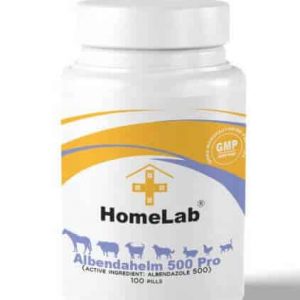Albendazole and Fenbendazole are both anti-parasitic medications that are used to treat various types of parasitic infections in dogs. They are both broad-spectrum anthelmintic drugs, which means that they are effective against a wide range of worms, including roundworms, tapeworms, and flukes.
-
Product on sale
 Fenbendazole Powder 100 percent Pure Dewormer for Dogs 100 gramsOriginal price was: $120.00.$108.00Current price is: $108.00.
Fenbendazole Powder 100 percent Pure Dewormer for Dogs 100 gramsOriginal price was: $120.00.$108.00Current price is: $108.00. -
Product on sale
 Albendazole Tablets Dewormer for Dogs 100 count (Albendahelm 500 Pro)Original price was: $65.00.$55.00Current price is: $55.00.
Albendazole Tablets Dewormer for Dogs 100 count (Albendahelm 500 Pro)Original price was: $65.00.$55.00Current price is: $55.00.
Albendazole vs Fenbendazole for treating Worm Infections

Albendazole is a broad-spectrum anthelmintic that is used to treat infections caused by roundworms, tapeworms, and hookworms. It is also used to treat infections caused by a type of parasitic worm called hydatid disease, which can cause cysts in the liver, lung, and other organs. Albendazole works by inhibiting the synthesis of microtubules, which are structural proteins that are essential for the survival and reproduction of worms. Without microtubules, the worms are unable to move and eventually die.
It is used to treat infections caused by worms such as roundworms, tapeworms, and hookworms in dogs. It is also used to treat infections caused by a type of parasitic worm called hydatid disease, which can cause cysts in the liver, lung, and other organs. Albendazole is available as a tablet and suspension and is typically taken by mouth once or twice a day.
Fenbendazole is also a broad-spectrum anthelmintic that is used to treat infections caused by roundworms, tapeworms, and hookworms. It is also used to treat infections caused by a type of parasitic worm called Giardia, which can cause diarrhea. Fenbendazole works by inhibiting the synthesis of protein in worms, which is necessary for their survival and reproduction. Without protein synthesis, the worms are unable to grow and eventually die.
Fenbendazole is used to treat infections caused by worms such as roundworms, tapeworms, and hookworms. It is also used to treat infections caused by a type of parasitic worm called Giardia, which can cause diarrhea. Fenbendazole is available as a suspension and is typically given by mouth once a day.
Side Effects

Both albendazole and fenbendazole are generally well tolerated, but they can cause side effects such as stomach pain, nausea, vomiting, and diarrhea. It is important to follow the dosing instructions provided by your healthcare provider and to complete the full course of treatment to ensure that the infection is completely eliminated.
Albendazole and fenbendazole belong to a class of medications called anthelmintics, which are used to kill or inhibit the growth of worms. While both drugs are effective at treating a variety of parasitic infections, there are some differences between the two that make them more or less suitable for certain types of infections.
Administering Albendazole vs Fenbendazole

Albendazole is available as a tablet and suspension and is typically taken by mouth once or twice a day. The dosage and duration of treatment depend on the type and severity of the infection being treated. Albendazole is generally well tolerated, but it can cause side effects such as stomach pain, nausea, vomiting, and diarrhea. It is important to follow the dosing instructions provided by your healthcare provider and to complete the full course of treatment to ensure that the infection is completely eliminated.
Fenbendazole is available as a suspension and is typically given by mouth once a day. The dosage and duration of treatment depend on the type and severity of the infection being treated. Fenbendazole is generally well tolerated, but it can cause side effects such as stomach pain, nausea, vomiting, and diarrhea. It is important to follow the dosing instructions provided by your healthcare provider and to complete the full course of treatment to ensure that the infection is completely eliminated.
Types of Infections Treat by Albendazole vs Fenbendazole
One of the main differences between albendazole and fenbendazole is the types of infections they are used to treat. While both drugs are effective against a variety of parasitic worms, albendazole is also used to treat infections caused by hydatid disease, which is a type of parasitic infection that can cause cysts in the liver, lung, and other organs. Fenbendazole, on the other hand, is primarily used to treat infections caused by roundworms, tapeworms, and hookworms.
Another difference between the two drugs is the way they are administered. Albendazole is available as a tablet and suspension, while fenbendazole is only available as a suspension. This may make it more convenient for some people to take albendazole, as it can be taken by mouth and does not require injection. Fenbendazole, on the other hand, must be given by mouth and may be less convenient for some people.
Both albendazole and fenbendazole are effective against a variety of parasitic infections. However, albendazole is typically preferred for the treatment of certain infections, such as ascariasis, hookworm infections, and trichuriasis, while fenbendazole is usually preferred for the treatment of roundworm infections and tapeworm infections. This is because albendazole is more effective against certain types of parasites than fenbendazole.
Half Life of Albendazole vs Fenbendazole
Albendazole also has a longer half-life than fenbendazole, meaning that it remains in the body longer and provides a longer period of protection. This makes albendazole the preferred drug for the prevention of relapses. In addition, albendazole is available in a variety of formulations, including tablets, suspensions, and chewable tablets, making it easier to administer and more convenient for patients.
Fenbendazole, on the other hand, has a shorter half-life than albendazole, and is not as effective against certain types of parasites as albendazole. However, it is more effective against certain other types of parasites, making it the preferred treatment for roundworm infections and tapeworm infections. Fenbendazole is also available in a variety of formulations, including tablets, suspensions, and chewable tablets.
Despite these differences, both albendazole and fenbendazole are generally well tolerated and are effective at treating a variety of parasitic infections. It is important to follow the dosing instructions provided by your healthcare provider.
Conclusion
In conclusion, albendazole and fenbendazole are two drugs used to treat parasitic infections. While both drugs are effective against a variety of parasites, albendazole is typically preferred for the treatment of certain infections, while fenbendazole is usually preferred for the treatment of roundworm infections and tapeworm infections. Albendazole has a longer half-life than fenbendazole, making it the preferred drug for the prevention of relapses, and it is available in a variety of formulations. Fenbendazole has a shorter half-life, and is not as effective against certain types of parasites as albendazole, but it is more effective against certain other types of parasites, and it is also available in a variety of formulations.
 Total Pooch Dog Supplements, Tear Stain Removers, De-wormers, Tylosin for Dogs and other great products.
Total Pooch Dog Supplements, Tear Stain Removers, De-wormers, Tylosin for Dogs and other great products.




